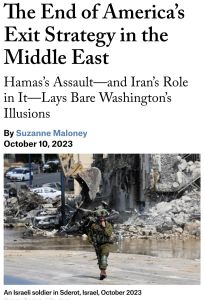
The End of America’s Exit Strategy in the Middle East
Hamas’s Assault—and Iran’s Role in It—Lays Bare Washington’s Illusions
Recommendation
Foreign policy expert Suzanne Maloney describes the heavy price the United States has paid for its involvement in the Middle East and Central Asia in the 21st century. In this illuminating essay, she notes that America’s efforts to disentangle itself through conciliatory gestures and softer diplomacy toward Iran were for naught, as the 2023 Hamas attack on Israel appears to have had tacit Iranian involvement. Despite attempts to redefine its role in the region, America must now toughen its posture to contain Iran’s aggression and nuclear weapons development. Maloney advocates for a more hard-line approach to keep Iran in check.
Summary
About the Author
Suzanne Maloney is vice president of the Brookings Institution and the director of its Foreign Policy Program.







Comment on this summary